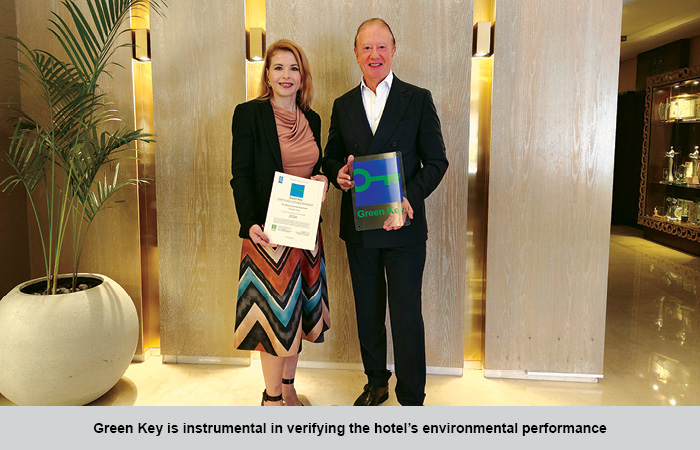The UAE has been working on sustainability over the years, the hospitality industry was the first to adopt it. TRAVTALK speaks with the pioneer behind adopting sustainability in hospitality, Iftikhar Hamdani Area Manager, Northern Emirates, Coral Beach Resort Sharjah, and Bahi Ajman Palace.
Shehara Rizly
Is the hospitality industry ready with infrastructure that suits sustainability?
The industry has made significant progress in recent years towards sustainability, but there is still a long way to go. Many hotels and resorts have implemented eco-friendly practices such as energy-efficient lighting, water conservation measures, and waste reduction programs.
However, there is still a need for more sustainable infrastructure, such as renewable energy sources, green building materials, and sustainable transportation options. Also, there is a need for more education and awareness among both the hospitality professionals as well as the guests about the importance of sustainability. Overall, while progress has been made, there is still much work to be done to ensure that the hospitality industry is truly sustainable.
What are the initiatives taken to incorporate sustainability?
There are many initiatives being taken to incorporate sustainability in hospitality industry in the past few years. The use of renewable energy sources such as solar and wind is becoming increasingly popular to reduce carbon emissions and promote sustainability. New hotel buildings are being designed and constructed with sustainability in mind, using materials that are environmentally friendly and energy efficient. Efforts are being made to reduce waste and increase recycling, with initiatives such as composting, recycling programs, and waste-to-energy projects.
The use of electric vehicles, public transportation, and cycling is being promoted to reduce carbon emissions and promote sustainability.
Will the industry be able to achieve zero carbon status by 2030?
It is possible for the hotel industry to achieve zero carbon status by 2030, but it will require significant effort and investment. Many hotels are already taking steps to reduce their carbon footprint by implementing energy-efficient technologies, using renewable energy sources, and reducing waste. However, achieving zero carbon status will require a comprehensive approach that involves all aspects of hotel operations, including transportation, food and beverage, and guest behaviour. It will also require collaboration between hotels, governments, and other stakeholders to create policies and incentives that support sustainable practices.
In your opinion, how can the Middle East or UAE hospitality leaders focus to achieve this milestone?
The UAE and Middle Eastern hospitality leaders can take initiatives, i.e. reducing energy consumption, using renewable energy sources, reducing water usage, and minimizing waste. Hospitality leaders can encourage guests to participate in sustainable actions. Sourcing food locally and using organic ingredients can reduce the carbon footprint of the hospitality industry. They can educate guests and staff on the importance of sustainability and how they could contribute to it.
Is there an impact when it comes to pricing, with sustainability standardisation or infrastructure development to adapt to sustainability?
Yes, there can be an impact on pricing when it comes to sustainability standardization or infrastructure development to adopt sustainability. For example, if a company decides to implement fully sustainable practices in their hotels, it may require investments in new equipment or green technology, which can increase the cost. However, in the long run, these sustainable practices can lead to cost savings through increased efficiency and reduced waste. While there may be short-term costs associated with sustainable standardization, the long-term benefits outweigh these costs and lead to a more sustainable and cost-effective future.
Which would be the most relevant criteria to ensure profitability and sustainability go hand in hand?
There are several criteria that can help ensure profitability and sustainability go together. Efficient use of resources can help reduce costs and minimize waste. Innovation can help hotels develop new revenue centers that are sustainable and profitable. Engaging with stakeholders can help hotels understand their clients’ needs. Being transparent and accountable about sustainability performance can help build trust with stakeholders and improve profitability.
Do you see enthusiasm from the younger generation of travellers towards hospitality?
Of late, we are receiving many youngsters and groups. So far, we hosted many young players of the UK cricket teams in both our hotels. Rise of social media has made travel accessible and appealing to young travellers, which has led to an increase in demand for the hospitality services.
 TravTalk Middle East Online Magazine
TravTalk Middle East Online Magazine





